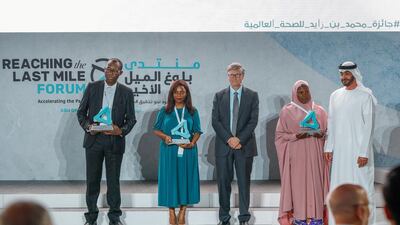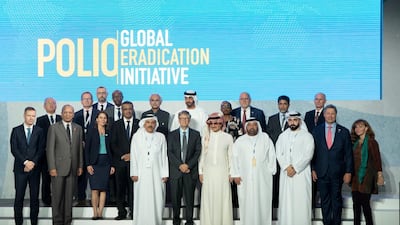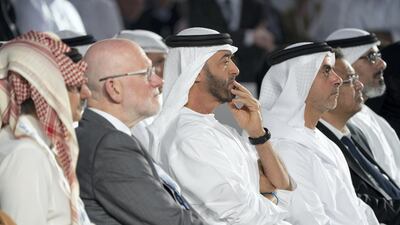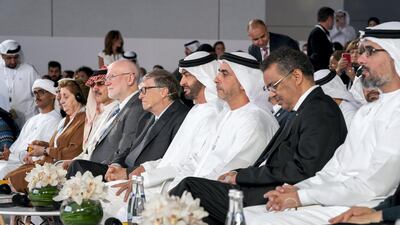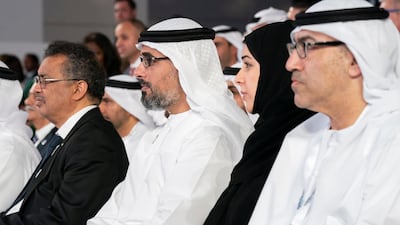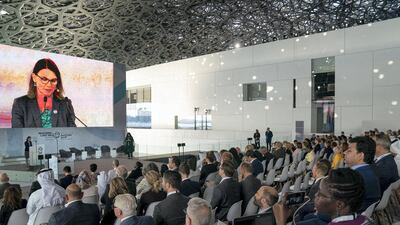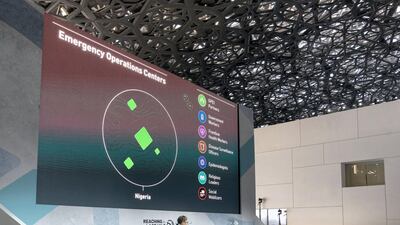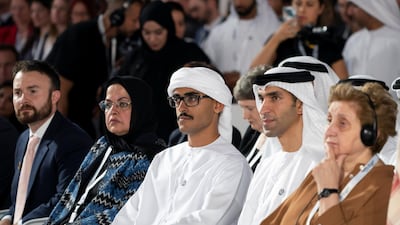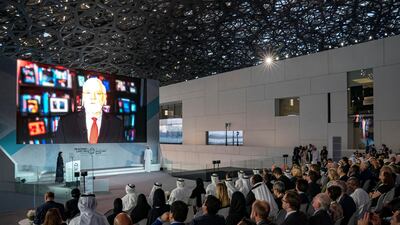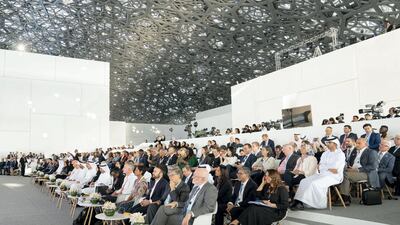World leaders came together in Abu Dhabi on Tuesday to pledge billions of dollars for a final push to wipe polio from the face of the Earth.
Sheikh Mohamed bin Zayed, Crown Prince of Abu Dhabi and Deputy Supreme Commander of the UAE Armed Forces, was joined by Bill Gates, the Microsoft billionaire and philanthropist, to renew the fight against preventable diseases that afflict some of the world’s poorest people, under the Global Eradication Initiative.
In total, $2.6 billion (Dh9.5bn) was pledged by governments and charitable organisations to finally stamp out polio. Afghanistan and Pakistan are the two remaining countries with the virus in circulation.
At the Reaching the Last Mile Forum at Louvre Abu Dhabi, there were also a series of separate commitments aimed at combating neglected tropical diseases including river blindness, guinea worm and trachoma.
They affect about 1.6 billion people, mainly in poverty-hit communities.
“A new era in global health” had begun, Mr Gates said, with many diseases “now in retreat”.
But despite progress in wiping out polio, with the second of three strains declared eradicated this year, he said work must go on to achieve the final milestone.
Mr Gates said the infrastructure put in place for the polio campaign would then be used to stamp out other diseases, helping the world’s children for decades to come.
“Any number other than zero is a problem,” he said. “Polio can spread very quickly. So as long as there’s any polio in the world, we need to keep vaccinating all children in the world.
“If we stopped all the eradication efforts, polio could have a resurgence, going back to hundreds of thousands of cases.”
About 18 million people who would have been paralysed by polio escaped because of vaccination efforts so far, Mr Gates said.
“They don’t know who they are, but in fact their lives are far, far better because of the efforts we have made," he said.
“While these last steps are undoubtedly the toughest, I’m optimistic that we will eradicate polio.
"The renewed financial support today from donors, including the generous increase from Sheikh Mohamed, underscores the confidence the world continues to have.”
Mr Gates pledged an extra $1.08bn to the final drive to eradicate polio, through his charitable foundation.
Sheikh Mohamed pledged a further $160 million, with nations including Pakistan, the UK, Germany, United States and Norway also committing significant resources.
Charitable donors included Rotary International, which pledged $150m, and Michael Bloomberg, the US politician and businessman who pledged $50m through his philanthropic foundation.
Meanwhile, the UAE announced that the world’s first ever World Neglected Tropical Diseases Day will take place on January 30 next year, to galvanise global support and raise awareness of a cause that has been championed by the country for years.
Three new partners were announced for the Reaching the Last Mile Fund, which was set up by Sheikh Mohamed and is supported by Mr Gates, to end river blindness and lymphatic filariasis.
In 2018, the initiative delivered more than 13.5 million treatments for the two diseases, and trained 76,000 healthcare workers.
The event also honoured frontline health workers who deliver vaccinations and treat patients with conditions such as Ebola.
They included Rahane Lawal, a mother of ten who saw her father-in-law shot dead and was kidnapped by bandits as a result of her work promoting vaccination in Nigeria.
A lifetime achievement award was given to William Foege, 83, a US physician who is credited with creating the plan that led to the elimination of smallpox.
Accepting the award through a video message, Mr Foege said those battling preventable diseases, including health workers and government leaders, were “rewriting history before it happens”.
One day, he said, they would be held in the same esteem as influential Renaissance and Enlightenment era figures such as Voltaire and Jean-Jacques Rousseau.
Progress was also hailed by Tedros Ghebreyesus, director general of the World Health Organisation, who said in his address that he looked forward to the day polio joined smallpox in being completely eradicated.
But Mr Ghebreyesus warned against complacency, and said many diseases afflicting poor people were a symptom of the deeper problem of inequality.
“We can and will make polio history,” he said. “One day, children will not need to be vaccinated against polio.
"But we know that even when polio is eradicated, even when guinea worm is eradicated, even when malaria is eradicated, children will continue to suffer from other threats.
“Guinea worm and malaria are symptoms of a deeper sickness, which is why, ultimately, our fight is not against a single disease.
"Our fight is against inequality. Our fight is against a world in which people get sick and die simply because they are poor, or female, or a refugee.
“Our fight is for a fundamental human right, a right to health for everyone, everywhere.”
